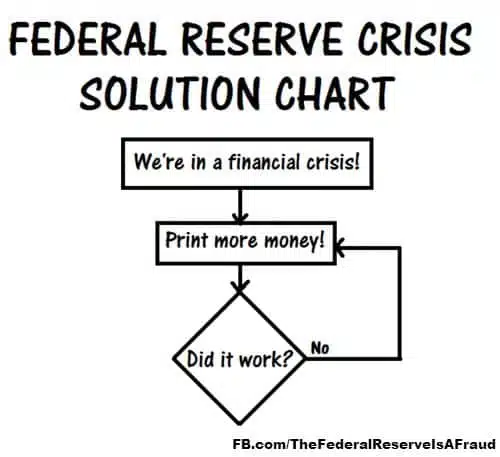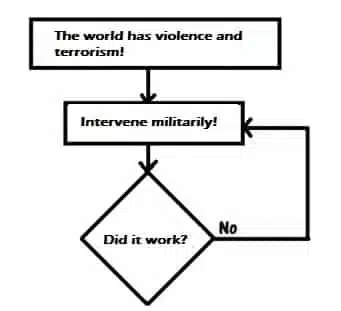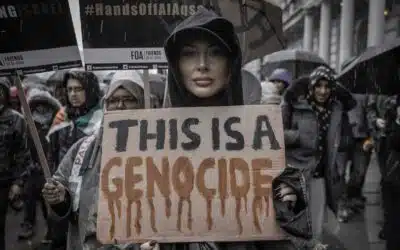There are “No Easy Answers in Mali”, the editors of the New York Times assert. They explain:
The extremist Islamist militias that seized control of northern Mali in April have imposed their fanatical beliefs and barbaric punishments on the region’s defenseless people, sending tens of thousands of refugees fleeing into neighboring Mauritania. And they have given sanctuary to notorious terrorist groups like Nigeria’s Boko Haram and Algeria’s Al Qaeda in the Islamic Maghreb, a group that Washington suspects may have been involved in the September attack on the American consulate in Libya….
Army officers opened the door to the extremists in March by overthrowing the democratically elected government. They claimed the government was not letting them wage an effective fight against the Libyan-armed Tuareg rebels who streamed into northern Mali after the overthrow of Col. Muammar el-Qaddafi.
But following the military coup, first the Tuareg rebels and then the Islamist militias easily took over Mali’s desert north, a region the size of France. International pressure forced the soldiers to install a civilian-led government in April. But the army, which has been accused of engaging in torture and sexual abuse of detainees, retains real power, and Mali’s institutions remain shattered.
The U.N. Security Council passed a resolution authorizing the creation of a military force to support that same abusive military regime in Mali to fight the extremists in the north. But
The transformation of northern Mali into a sanctuary for terrorists and the subjection of its people to medieval cruelties are a threat to the entire West African region. But even with the Security Council vote, it seems unrealistic to expect an effective solution anytime soon.
There might be no easy answers to how to resolve this mess. But there is certainly an easy and obvious answer for how it could have been prevented in the first place that the Times doesn’t bother to point out. We could just stop intervening and creating these messes in the first place. In this case, for instance, the U.S. could have chosen not to militarily intervene in Libya so as to prolong the internal conflict there and to escalate the violence and destabilize the entire region.
Another Times article has more details on the U.N. force:
The United Nations Security Council unanimously approved a resolution on Thursday that will send thousands of African troops into the desert nation of Mali to help oust Islamist extremists who have turned its northern half into a vast Qaeda enclave and training ground, menacing the stability of neighboring states and posing a potent new international terrorism threat….
The final version of the resolution reflected what diplomats called some compromises between France and the United States, which had been skeptical that the Malian Army could be made capable of participating in a potentially long and violent struggle to retake the country’s northern area, roughly twice the size of Germany….
Language was also included specifically intended to guard against human rights abuses by the Malian military in any operation in the north, where ethnic tensions linked to the occupation by Islamist militants are known to be on the rise. A report released Thursday by Human Rights Watch enumerated instances of abuses in Mali committed by security forces and others since the military coup.
Tens of thousands of Malians have fled the north since Islamist militias seized control there after the coup, which left a power vacuum that has yet to be resolved….
Rights activists monitoring the Mali crisis had a mixed reaction to the Security Council resolution. While they welcomed action against abuses by the Islamists, some expressed concern that the Malian Army, humiliated by the loss of half the country, would be bent on revenge.
Somehow, intervening yet again in such a manner, to back an abusive regime, doesn’t seem like such a good idea to me. Here’s a bit more from the Human Rights Watch report:
Pro-government militias and ethnically allied youth groups have prepared lists of people in the north who would be targeted for reprisal once the government forces retook control, people who helped prepare the lists told Human Rights Watch….
Human Rights Watch research in Mali since April found that security forces loyal to coup leader Capt. Amadou Sanogohave been implicated in numerous serious abuses including torture, enforced disappearance, and the intimidation of opposition voices. Outside the capital, the Malian army has arbitrarily detained and executed mostly Tuareg and Arab men for their alleged connections to rebel groups in the north….
Many northern residents and militiamen who spoke to Human Rights Watch expressed concern that such an intervention might be a catalyst for acts of collective punishment, particularly against the Tuareg.
What safeguards did the U.N. resolution put in place to protect against abuses by the military regime? It
Urges Member States, regional and international organizations to provide coordinated assistance, expertise, training, including on human rights and international humanitarian law, and capacity-building support to the Malian Defence and Security Forces, consistent with their domestic requirements, in order to restore the authority of the State of Mali over its entire national territory, to uphold the unity and territorial integrity of Mali and to reduce the threat posed by terrorist organizations and associated groups…
So international forces are just supposed to “teach” the regime how to behave and encourage it to respect human rights and international law. You know, kind of like the U.S. did with the armed rebels seeking to overthrow the Gaddafi regime in Libya, who committed some of the worst massacres and other atrocities, such as the ethnic cleansing of entire towns. Or like it is doing with the armed rebels and their al Qaeda allies attempting to overthrow the Assad regime in Syria.
Somehow, the notion that the U.S. should just stop creating these kinds of problems in the first place with its military adventures in other countries seems to totally escape observers in the mainstream media. In this regard, U.S. foreign policy is a lot like Federal Reserve monetary policy:

And for foreign policy:

Isn’t institutionalized insanity just grand?


